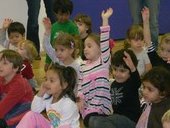The University’s new Educational Equity Resource Center was announced April 2 in President Kaler’s State of the University address. The center is the region’s first dedicated hub for information about closing the achievement gap, housed in CEHD. It was formed as a portal serving early childhood, K–12, and youth educators and U researchers and programs.
Educational equity is the work of eliminating demographically predictable outcomes in educational access and achievement. Issues of educational equity exist across the lifespan, from cradle to career.
The website www.gap.umn.edu aims to provide easy access for educators to information on U resources including research, professional development, classroom resources, and related programs. Other projects to develop connections are ongoing, including a community-university advisory council.
The center is headed by educational psychology professor Michael Rodriguez and co-directed by Julie Sweitzer, director of the University’s College Readiness Consortium.
As the U’s Campbell Leadership Chair, Rodriguez has met over the past two years with hundreds of school and educational leaders about the persistent achievement and opportunity gaps among different demographic groups.
“The most common question I get is ‘What works?’” says Rodriguez. “There is no one thing that works. Instead we need to focus on ‘What works for whom, in what context and conditions?’”
Save the date: June 2016 convening
The University will host a two-day event on educational equity in action June 20–21, 2016. It will draw from many contexts that impact educational outcomes for children and youth, including early childhood, K–12, and higher education, community, and employment.
Leaders from educational, community, and political arenas will have the opportunity to consider the current state of educational equity in Minnesota relative to the nation and the world.
With a focus on achievement gaps from pre–K to higher education, Minnesota is strongly positioned to develop and execute coordinated action strategies to achieve greater educational equity by increasing movement toward closing educational disparities.
Keynote speakers include NYU professor of education Pedro Noguera, a sociologist with expertise on the ways in which schools are influenced by social and economic conditions, and San Francisco State U professor Jeff Duncan-Andrade, known for his work with the Roses in Concrete project.
Day 1 will begin with national keynote speakers and focused small-group sessions to consider the Minnesota context.
Day 2 will include multiple sessions designed to facilitate the development of action strategies with participants, focusing on the major age arenas (early childhood, adolescents, and emerging adults) and major contexts (schools, communities, and the larger society). Participants will guide development of an action plan for achieving educational equity.
The schedule will provide ample opportunity to interact with participants and speakers throughout the conference.
Watch for more information, including registration details, in the next issue and online at www.gap.umn.edu.
Fall 2015
